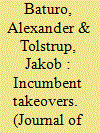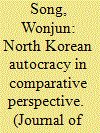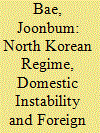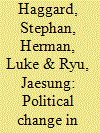|
|
|
Sort Order |
|
|
|
Items / Page
|
|
|
|
|
|
|
| Srl | Item |
| 1 |
ID:
189823


|
|
|
|
|
| Summary/Abstract |
By the end of the second decade of the 21st century, the Russian foreign
policy discourse had transformed from hard-headed “sober realism” into
bizarre “values-obsessed realism.” The texts of Russia’s official strategies
now appeal to such aspects of political identity as “spiritual values,”
“cultural (civilizational) code,” “historical truth,” etc. Such appeals,
coupled with almost eschatological rhetoric, are not uncommon in official
speeches of the country’s political leadership. But this shift in political
discourse cannot be explained just by the reaction to the changes in the
international situation after the incorporation of Crimea into Russia.
The author suggests that the reason is a change in the political leader’s
mindset after staying in power for such a long time. As his powers get
extended, almost any political leader begins to think in “historical”
and “global” categories, viewing personnel unchangeability not as
vulnerability, but, on the contrary, as proof of unique “stability” and
“governability.”
|
|
|
|
|
|
|
|
|
|
|
|
|
|
|
|
| 2 |
ID:
190847


|
|
|
|
|
| Summary/Abstract |
The expansion of power by incumbent political leaders has become the subject of increased scholarly attention. In democracies, this is known as ‘subversions by the ruling executive’, ‘executive aggrandizement’, or ‘autogolpe’; in autocracies, researchers study ‘personalization’, ‘transition to personal rulership’, or ‘power-grabbing’. While the terminological landscape is rich, there is little conceptual agreement of what leader-driven power expansion is (and is not). Furthermore, we still lack broad data that allow us to investigate the phenomenon systematically across democracy and autocracy. The contribution of this article is twofold. First, it offers a unified approach to study leader-driven power expansion – incumbent takeovers – across the political regime spectrum. Second, drawing from 11 datasets and original data collection and coding, we introduce a new, comprehensive dataset on 495 individual takeover events carried out by 279 political leaders in 132 countries in the period 1918–2019. We provide estimates of the takeover onset years, the time to takeover, the length of the takeover spells, and discuss the differences between distinct indicators, inter alia. Future research may leverage these data for a better understanding of the drivers of incumbent takeovers as well as the role of takeovers in regime change, civil wars, coups, and uprisings.
|
|
|
|
|
|
|
|
|
|
|
|
|
|
|
|
| 3 |
ID:
160631


|
|
|
|
|
| Summary/Abstract |
The North Korean regime is unique among dictatorships because it is both long-lasting and highly personalized. We argue that initial factionalization of the regime, coupled with the presence of multiple foreign backers early in the regime, allowed the first leader to personalize the regime by first wresting power from the military and then subsequently curbing the autonomous power of the Korean Worker's Party. Using a measure of personalism constructed from historical data, we trace the consolidation of personal power in the North Korean regime and compare it to other communist regimes in the region to show how the evolution of personalist rule in these cases differed. We then explain this sequence of personalization in North Korea by showing how regime imposition by one foreign power, the Soviet Union, combined with military backing from a second foreign power, China, incentivized Kim Il-sung to consolidate personal control over the military and internal security apparatus by reducing the threat of military backlash.
|
|
|
|
|
|
|
|
|
|
|
|
|
|
|
|
| 4 |
ID:
159815


|
|
|
| 5 |
ID:
133771


|
|
|
|
|
| Publication |
2014.
|
| Summary/Abstract |
During the succession from Kim Jong Il to Kim Jong Un, North Korea witnessed a revival of party institutions. However, the most distinctive feature of the transition was a succession of purges that replaced powerful figures from the Kim Jong Il era with new loyalists. The system remains personalist, but with strong reliance on the military and security apparatus.
|
|
|
|
|
|
|
|
|
|
|
|
|
|
|
|
| 6 |
ID:
170082


|
|
|
|
|
| Publication |
New Delhi, Bloomsbury, 2019.
|
| Description |
xvii, 239p.hbk
|
| Standard Number |
9789389165920
|
|
|
|
|
|
|
|
|
|
|
|
Copies: C:1/I:0,R:0,Q:0
Circulation
| Accession# | Call# | Current Location | Status | Policy | Location |
| 059815 | 327.73/CHA 059815 | Main | On Shelf | General | |
|
|
|
|
|
|
|
|
|